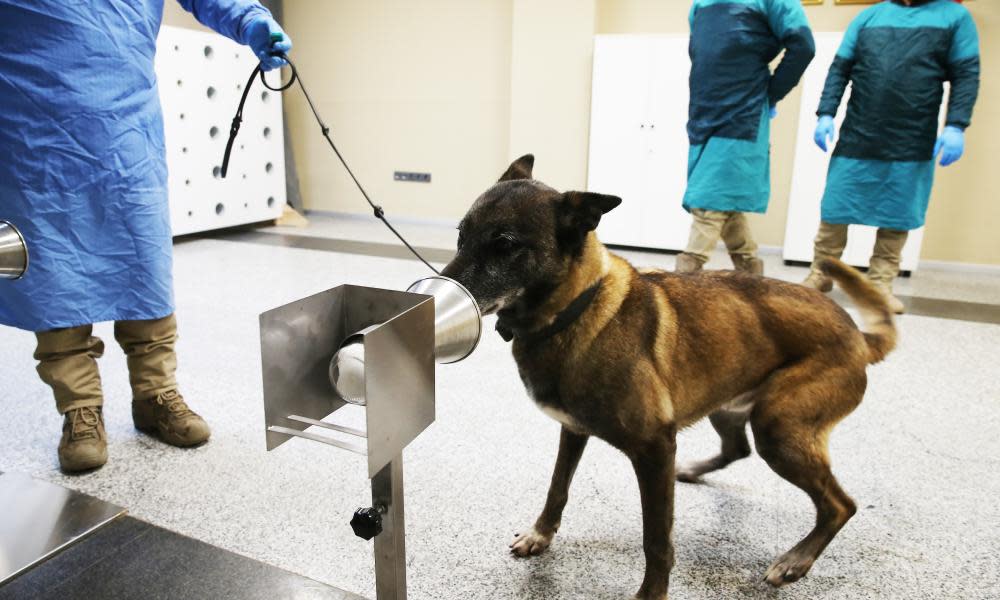Dogs may be better at detecting Covid-19 than nasal PCR tests, study finds

Trained dogs may be able to detect Covid-19 more effectively than nasal swab PCR tests, according to new research.
A study published on Wednesday by the peer-reviewed Plos One journal found that canines were able to better detect the presence of Covid than PCR antigenic tests in both symptomatic and asymptomatic people.
Related: ‘A protective bubble’: Covid-sniffing dogs help scientists – and Metallica – spot infection
In the study, trained dogs were able to detect Covid in 97% of symptomatic cases and nearly 100% of asymptomatic cases.
“The dog doesn’t lie,” Dominique Grandjean, a professor at the Alfort National Veterinary School in France and a study author, told Science News, noting that different errors can occur with PCR tests.
The study featured 335 participants from Covid screening centers in Paris. Of the participants, 109 were positive with Covid, including 31 who were asymptomatic.
The detection dogs, provided by French fire stations and the United Arab Emirates, received three to six weeks of training, depending on if a dog was previously trained for odor detection.
The dogs sniffed samples of human sweat placed in an olfaction cone. If a dog detected Covid, it sat down in front of the cone.
Ultimately, the trained dogs were more sensitive to positive cases. Nasal PCR tests were better able to better detect negative cases.
In two false positive cases, dogs falsely identified other coronavirus respiratory illness strains that were not Covid.
While there have been previous studies on the capability of dogs to detect Covid, this is believed to be the first to compare the accuracy of dogs to antigenic tests.
A study published in May by researchers in the UK found that trained dogs could detect Covid with an accuracy of 82% to 94%, NBC News reported.
A 2021 study in Florida found that dogs had a 73% to 93% accuracy rate after a month of training.
The authors of the French study said more dogs could soon be used to detect Covid in mass screening settings including airports.
PCR tests can take days to deliver a result. The trained dogs were able to analyze 20 samples in just 15 seconds, Grandjean told NBC.
Using dogs for Covid testing could also benefit those who have trouble tolerating nasal swabs, such as patients with Alzheimer’s, the authors said.
Experts not affiliated with the study warn that translating its positive results into everyday use could prove difficult.
“The ideal – and I would consider it the Holy Grail – is that the dog is just standing there, a person walks by, and they say, ‘Yes, no, yes, no, yes, no,’” Dr Cynthia Otto, director of the Penn Vet Working Dog Center at the University of Pennsylvania, told NBC.
“That eventually could be done, but making sure it’s done with all the proper controls and quality assurances and safety – it’s a big step. I haven’t seen anyone who has proposed how to make that transition in a way that’s scientific and safe.”
Dogs are starting to be used at mass testing sites. In September 2021, Miami international airport was the first US airport to deploy Covid dogs.
Airports in the UAE, Finland and other countries use dogs to sniff out Covid. Schools in Massachusetts and Hawaii have also employed dogs to test students.


